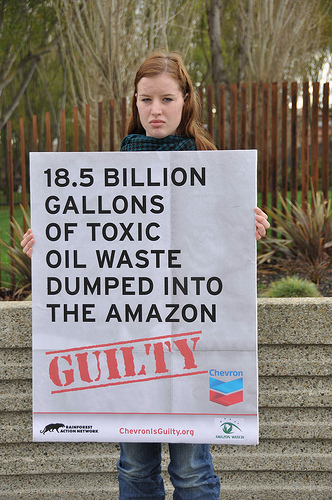 When a judge down in Ecuador issued a guilty verdict against Chevron last month, the company immediately fired off a press release calling the judgment “illegitimate and unenforceable.” Which is funny, because that is the exact opposite of what the company used to say about the Ecuadorean court system — you know, back when the company itself was the one arguing that the whole trial should be moved from a New York City federal district court, where it was originally filed, down to Ecuador.
When a judge down in Ecuador issued a guilty verdict against Chevron last month, the company immediately fired off a press release calling the judgment “illegitimate and unenforceable.” Which is funny, because that is the exact opposite of what the company used to say about the Ecuadorean court system — you know, back when the company itself was the one arguing that the whole trial should be moved from a New York City federal district court, where it was originally filed, down to Ecuador.
The good folks over at DeSmogBlog did some digging and found exactly what the company used to say about the Ecuadorean justice system, and those comments stand in stark contrast to what the company says now. Of course, that was back when a corruptible, business-friendly, right-wing administration was in power, hence before a guilty verdict became inevitable and, now, a reality. But Chevron’s recent denunciations of the Ecuadorean justice system go well beyond the hypocritical whining of a sore loser.
Here’s the scoop from DeSmogBlog writer Brendan Demelle (emphasis from the original):
From 1993 until the case was moved to Ecuador in 2002, Chevron argued aggressively in U.S. courts that Ecuador was the preferred forum for the suit because the pollution occurred there. It was the plaintiffs who first contended that the case should be heard in New York, where Texaco was headquartered, and away from the possible corruption in Ecuador.
Historically, the oil industry has had a tight grip on Latin American governments, enjoying immense control over their own destiny. Wheels were greased with bribes, and government officials were loyal to the companies’ interests. Ecuador’s government was not immune to this oil industry influence, as the documents reveal.
For example, a 1993 letter addressed to the State Department from the Ecuadorian ambassador to the United States was written with the help of Texaco government affairs official Michael Kostiw…
The letter that the company man helped to craft for the ambassador argues that the case should be tried in Ecuador, not the United States, because “only Ecuadorian authorities have the competence to pass judgment on such cases.” [PDF]
The hypocrisy of that statement is now stunning in the wake of Chevron’s reaction to the guilty verdict handed down recently by a competent Ecuadorian judge who originally fined the company some $8 billion for its destruction of the rainforest and local communities, an amount that later rose to over $18 billion due to Chevron’s failure to acknowledge and apologize for its pollution. Instead, Chevron immediately labeled the judgment “illegitimate and unenforceable” and seemed to suggest that Ecuador had committed “fraud” by leveling the guilty verdict against Texaco.
That is in sharp contrast to the company’s earlier touting of the fairness and independence of the Ecuadorian court system in affidavits submitted to the court. Chevron argued loudly that Ecuador was the correct venue to try the case (PDF pg 18). In one affidavit, the company’s own hand-picked expert noted that the U.S. court “should not be concerned about the ability of the Ecuadorian courts to dispense independent, impartial justice…. Ecuador’s judicial system is neither corrupt nor unfair… Ecuador has a democratic government with an independent judiciary.” [PDF]
Demelle examined a number of corporate memos, letters, and meeting records pertaining to Chevron/Texaco’s efforts to get the trial moved to Ecuador, and found that there was quite a bit of “ethically questionable” behavior involved in how the oil giant went about trying to get its way. Backroom deals and improper conduct abound in this sordid tale, as you might imagine.
All of which lays bare the complete and utter hypocrisy of Chevron. The company quite literally made its own bed — first by deliberately dumping over 18 billion gallons of toxic oil waste in the Ecuadorean Amazon, then by insisting on Ecuador as the venue for determining the company’s guilt, and pulling every and any dirty trick imaginable to corrupt the entire judicial process and evade its responsibility to clean up the pollution in the Amazon. If the company had even an ounce of dignity left, it would pay to clean up its mess in Ecuador and beg forgiveness from the thousands of Ecuadoreans poisoned by its oil pollution.
I’m not holding my breath though. An ounce is probably far more than Chevron can muster at this point.